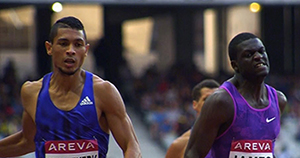
Wayde van Niekerk and Kirani James
Photo: deuxHD DIRECT |
Once again, Kovsie Wayde van Niekerk has made history by defeating the London 2012 Olympic Games champion, Kirani James, of Grenada in the Caribbean.
On 4 July 2015, he surged 0.79 seconds ahead of Kirani in his number five lane, becoming the first African to cover 400m in less than 44 seconds. The Kovsie student won the race at 43.96, occupying 10th place on the International Association of Athletics Federations (IAAF) Diamond League all-time list.
Kovsies were still celebrating the gold medalist’s South African record-setting time of 44.24 on 13 June 2015, when he dominated the Diamond League meeting. At the previous race in New York, Van Niekerk improved on his own national record of 44.38. With an impressive dash to the finish line at that particular event, he surpassed Christopher Brown’s 400m record.
In addition to the country’s record, Van Niekerk made his name as one of the continent’s record-breakers. On 7 June 2015, he broke the 1986 African 300m record. Van Niekerk replaced Ivorian Gabriel Tiacoh’s best time of 31.74 with a 31.63 championship win at the Birmingham Diamond League meeting. Simultaneously, he bettered Morné Nagel’s 2006 South African national record.
Following this outstanding performance, he was positioned in 10th place on the world list in the men’s 300m.
Currently, Van Niekerk is preparing for the 14 July 2015 Diamond League meeting to be held in Lucerne, Switzerland. His last Lucerne race was in 2014 where he clocked 20.19 in the men’s 200m. Based on his recent successes, Van Niekerk seems to have launched himself on a history-making spree, and may well set a new personal best.